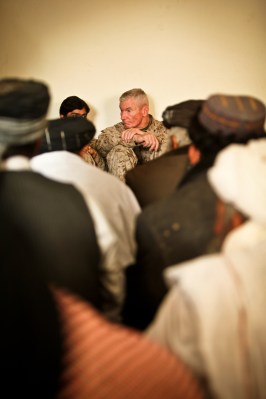Marine Major General John Toolan speaking to Marines in Kandahar during his command there.
After years of U.S. officials insisting Afghanistan is not turning into another Vietnam, a two-star U.S. Marine general — just back from a year-long combat tour there — says Afghanistan could well end up resembling the southeast Asian nation.
Major General John Toolan insisted Tuesday that while Afghanistan may not be “highly successful” in the short term, the arc of history requires U.S. and allied efforts there to cauterize the regional instability that threatens Pakistan’s nuclear weapons, That’s not so different, he suggested, from the way the U.S. war in Indochina halted the communists’ deeper push into southeast Asia, and nurtured the economic powerhouses there today.
Toolan is just back from a year in Helmand province in southern Afghanistan. Over breakfast Tuesday, among the first words out of his mouth dealt with the lack of cooperation he got from the Pakistan military just across the border.
“Just on the other side on the other side of the Pakistani border they’ve got huge caches of IED-making material, et cetera,” he said. “My problem with [the Afghan border village of] Baramcha — right across Baramcha, in Pakistan, lethal aid is coming in, and drugs are going out. We saw it, we interdicted a lot…but it’s a pittance – it’s a really small percentage – I’m told by DEA that that’s probably less than 12% of the total amount of opium that’s moving across in and out of the border.”
So what’s happening just across that border, in Pakistan?
“The 12th Corps of the Pakistani army is right there and they’re not doing anything,” Toolan said forthrightly. “It’s frustrating.”
He acknowledged that Pakistan is leery of pressing insurgents on its side of the border too much for fear of angering Baluchistan rebels. So what should the U.S. and its allies do?
“I think that’s a question I really can’t answer,” he said. “From my perspective, as a military commander, having to deal with the problem, it’s like I can’t shut the water off — I can just keep mopping the floor, but I can’t turn the water off.”
Battleland began hearing echoes of the past. Building a house amid quicksand has always been a challenge. Toolan’s details of what’s happening along the Afghan-Pakistan frontier – after a decade of war – sounded familiar. The inability of the U.S. to stop the flow of men and materiel from flooding a nation the U.S. is trying to build led Battleland to ask: hey, is Pakistan the new North Vietnam? Are the Taliban the new Viet Cong?
Unlike many officers – who would have run from that question like a live hand grenade tossed into their lap – Toolan caught it, and studied it closely.

Marine photo / Cpl. Bryan Nygaard
“Actually, I think I got that metaphor [shutting the water off, or mopping it up] from something I read about Vietnam, and the challenges that were associated in being able to reach out and suppress the North Vietnamese and the Viet Cong,” he said. “If you take the short-term view of Afghanistan, or of Vietnam, for example, I think people might say we didn’t do very well, we’re very frustrated by the whole issue of communists having freedom of movement just outside the borders.”
But Toolan recalled what he’d overheard Singapore Minister Mentor Lee Kwan Yew telling then-defense secretary Donald Rumsfeld several years ago when Toolan was on Rumsfeld’s staff:
Secretary, you need to stay the course in Iraq, because I’m telling you, the only reason why Singapore and Malaysia and Indonesia and all those tigers are doing well today is because you stayed the course 40 years ago.
Wait a minute. The U.S. left South Vietnam in 1973, and it fell to the North two years later.
“You may not see the benefits of what occurred in Vietnam back in ‘60s and ‘70s, but certainly people recognize it today…we stayed the course in Vietnam for 10 years, and I think those 10 years were a tough 10 years, but because of that, we wore down the threat – the threat to the rest of southeast Asia,” Toolan said. “I think that there’s a parallel, in that we may not see, in the short term, a highly-successful Afghanistan, but what we will see is some stability in the region.”
And why is that important?
“I remind some people that there is a lot of nuclear weapons pretty close around Afghanistan, and that maintaining stability in the region is as important as establishing stability in Afghanistan,” Toolan concluded. “I think in the long term we’ll see, so long as this regional stability is sustained and we don’t have nuclear conflagration and all that kind of stuff, what we did will pay off.”


